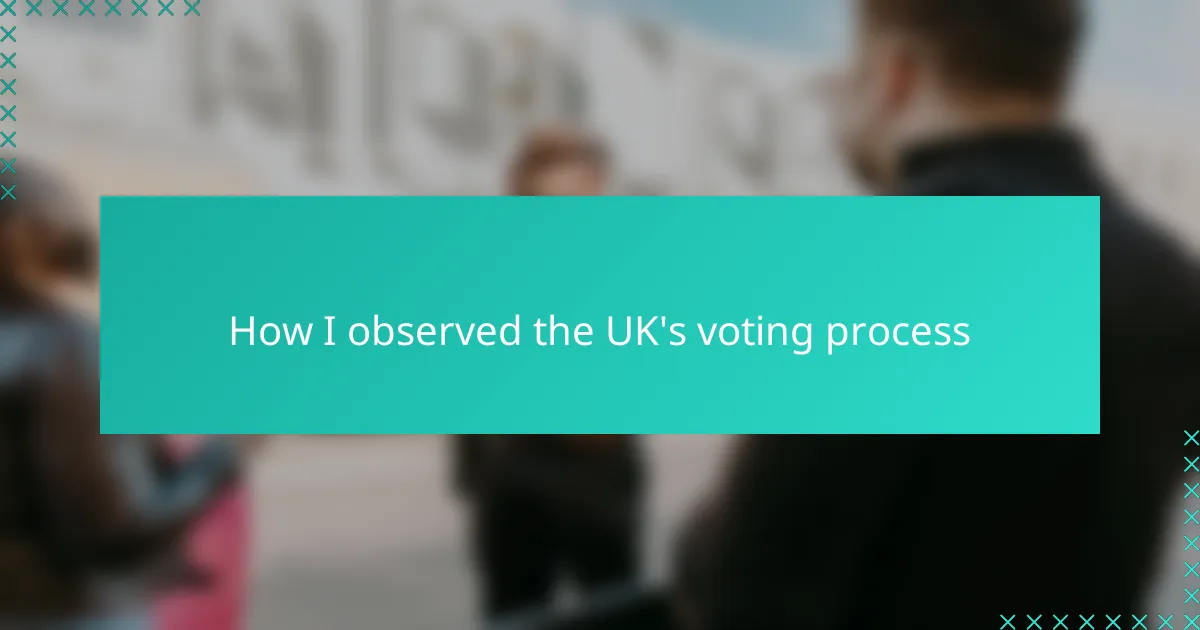Key takeaways
- The UK’s “First Past the Post” voting system simplifies outcomes but can marginalize smaller parties, raising questions about true representation.
- Voter turnout and local engagement are crucial for a vibrant democracy, as each individual vote can significantly impact political outcomes.
- Challenges such as complex administrative procedures and physical accessibility issues can discourage participation, highlighting the need for inclusivity in the voting process.
- Observing the UK’s electoral practices emphasizes the importance of transparency, clarity, and voter confidentiality in enhancing public trust and engagement in democracy.
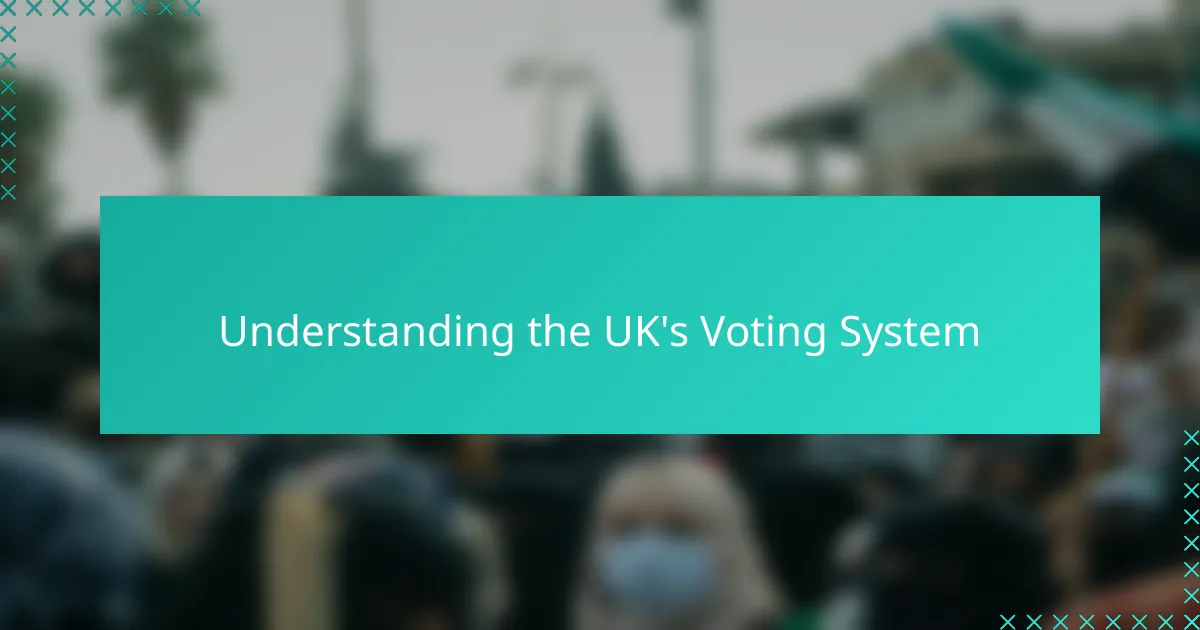
Understanding the UK’s Voting System
What strikes me most about the UK’s voting system is its simplicity on the surface, yet complexity underneath. The “First Past the Post” method, where the candidate with the most votes wins a constituency, seems straightforward—almost like a race where crossing the finish line first means victory. But have you ever wondered how this impacts representation across diverse communities?
From my observation, this system often leads to clear winners, but sometimes at the cost of smaller parties getting left behind. It made me question whether this approach truly captures the full spectrum of voters’ preferences or just the majority in each area. Experiencing this firsthand, I felt both the clarity and frustration voters might experience when their voices don’t translate into proportional power.
Another nuance I noticed is how voter turnout and local engagement shape outcomes more than just numbers on a ballot paper. When people show up to vote, their participation breathes life into democracy. It made me appreciate how each individual’s decision can ripple through the political landscape, turning what could feel like a mechanical process into something deeply personal and consequential.
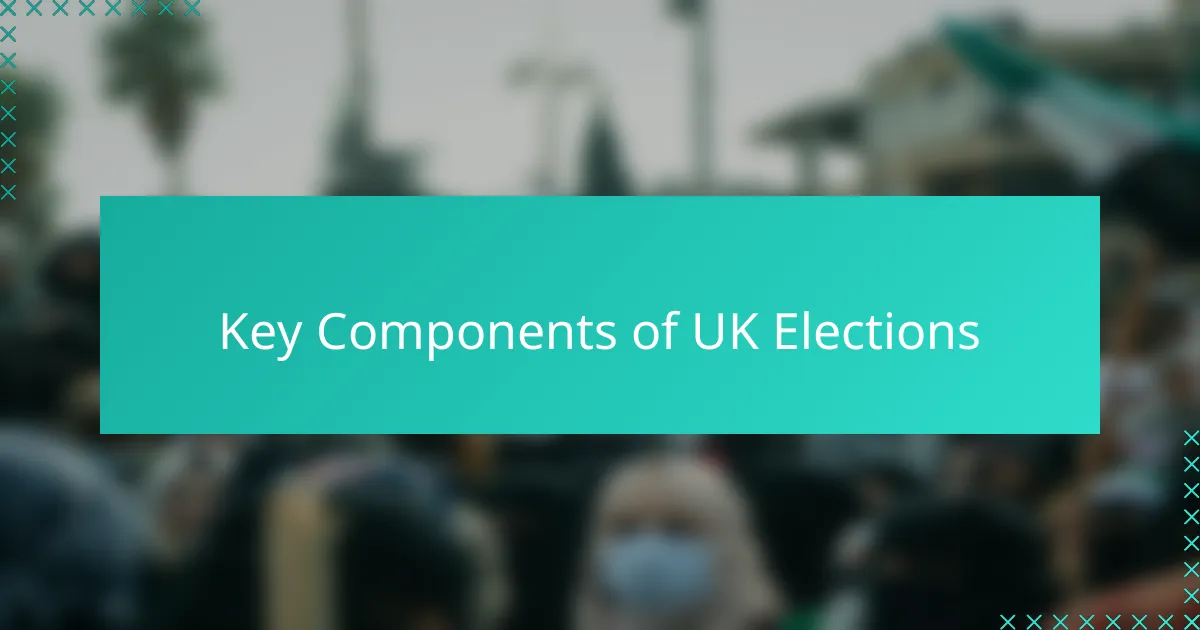
Key Components of UK Elections
One of the key elements I noticed is the role of constituencies, each sending one Member of Parliament to the House of Commons. It’s fascinating how the country is essentially divided into these electoral battlegrounds, where local issues can weigh heavily, sometimes tipping the balance in unexpected ways. I found myself pondering how this micro-level focus influences national politics overall.
Another component that stood out to me was the eligibility criteria for voters. Seeing the strict rules around who can vote—citizenship status, age, and registration—made me realize how these gates shape the very foundation of democratic participation. It made me reflect on how inclusive or exclusive a system truly is when these lines are drawn.
Then there’s the timing and frequency of elections, which seem routine but actually have profound strategic importance. From my experience observing, the unpredictability of when an election might be called can influence campaigning tactics and voter enthusiasm alike. Have you ever thought about how the mere timing of an election can sway the momentum of candidates? It’s a subtle but powerful factor in the process.
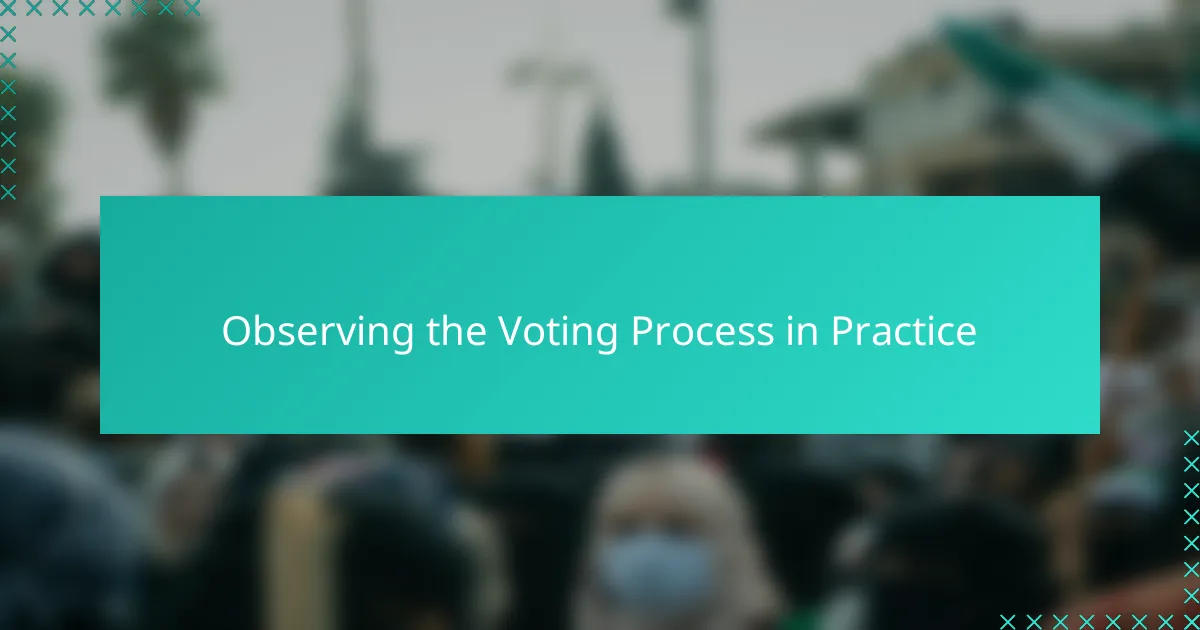
Observing the Voting Process in Practice
Watching people arrive at the polling station, I noticed a mix of anticipation and routine. Some voters chatted nervously while others seemed calm, focused on the simple act of making their choice. It struck me how this moment—casting a ballot—holds so much weight beneath its unassuming surface.
The process itself felt surprisingly efficient: checking the voter list, receiving the ballot paper, and entering a private booth. Yet, I wondered if everyone felt equally confident in their understanding, especially first-time voters. From what I saw, the presence of helpful staff made a noticeable difference, transforming what could be an intimidating experience into an accessible one.
What truly caught my attention was the silent power of that private space where each person made their decision away from prying eyes. It made me reflect on how essential confidentiality is to democracy—without it, would voters feel free to express their true preferences? Observing this in practice deepened my appreciation for the safeguards that protect the integrity of the vote.
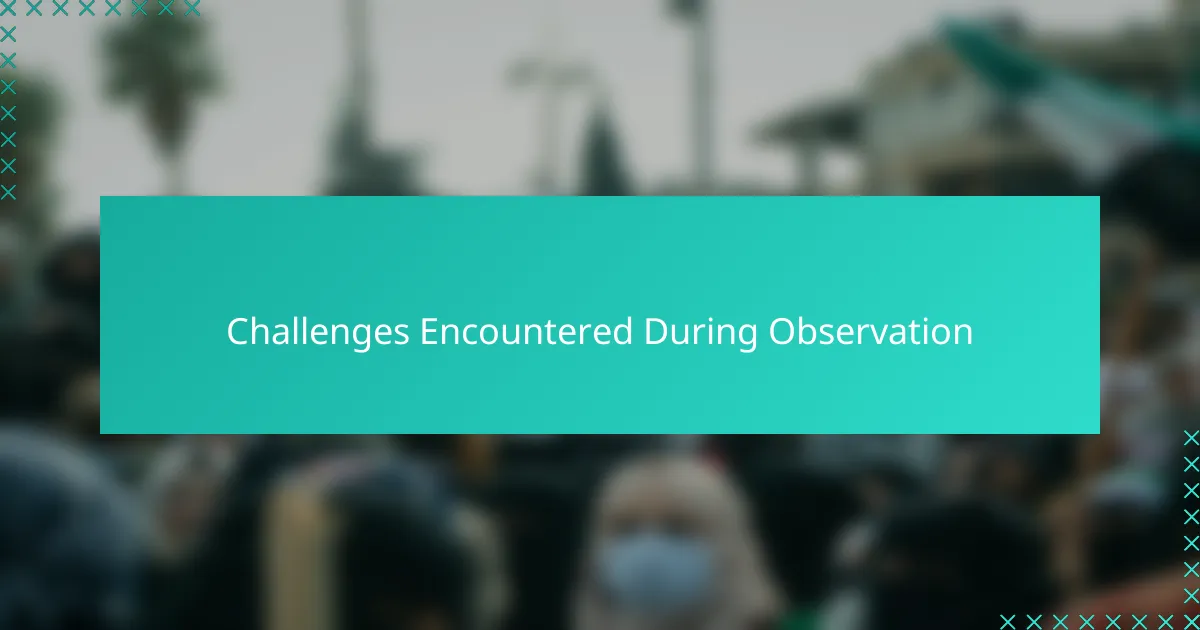
Challenges Encountered During Observation
One challenge I couldn’t ignore was how confusing some of the administrative procedures appeared to certain voters. I saw individuals hesitating over identification requirements and registration checks, which seemed to create moments of uncertainty and anxiety. It made me wonder—does this complexity discourage some people from participating fully in the process?
Another hurdle I noticed was the pressure faced by polling staff in managing a steady flow of voters while ensuring accuracy and fairness. The demand for quick yet meticulous work was palpable, and I could sense the weight of responsibility on their shoulders. Watching this, I reflected on how critical their role is, and how easily small errors could affect outcomes.
Lastly, the physical layout of some polling stations presented unexpected obstacles, especially for those with mobility issues. I observed a few elderly voters struggling to navigate crowded spaces or find accessible entrances, which challenged the ideal of equal access. It raised the question—are all voters truly given an equal opportunity to cast their ballot in comfort and dignity?
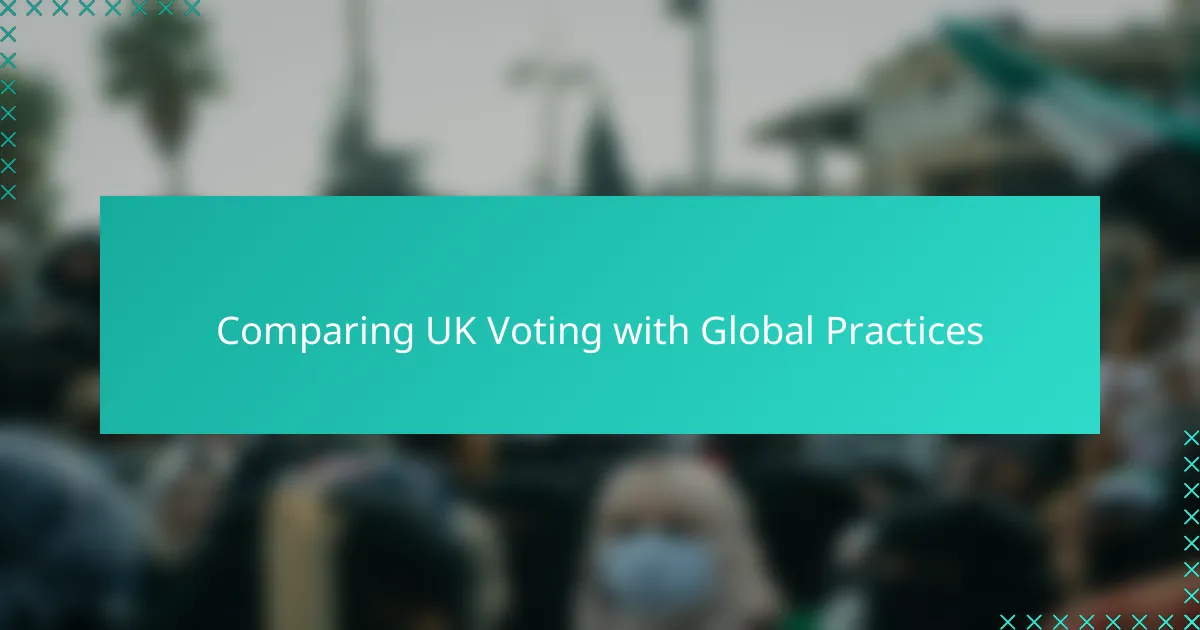
Comparing UK Voting with Global Practices
Comparing the UK’s voting system with others around the world, I noticed how distinctive the “First Past the Post” method is. Unlike proportional representation used in many European countries, the UK’s approach often simplifies results but can leave smaller parties sidelined. It made me wonder: does this simplicity sacrifice the rich diversity of political voices that other systems seem to capture better?
In some nations, like Germany or New Zealand, voting blends district-based choices with overall party proportionality, which strikes me as a clever way to balance local and national interests. Observing the UK’s process, I couldn’t help but reflect on how these mixed systems might encourage broader participation and arguably lead to coalitions that reflect a wider array of opinions. Could the UK benefit from such hybrid models, or does its tradition hold stronger appeal despite the trade-offs?
What really caught my attention was how the UK places strong emphasis on the secrecy and immediacy of voting, similar to many established democracies. Yet, when I think about countries where voting happens electronically or via mail, I wonder about the trade-offs in trust and accessibility. From my experience, the tactile, in-person act in the UK seems to forge a personal connection to democracy that digital methods might struggle to replicate—though I’m curious how this will evolve over time.
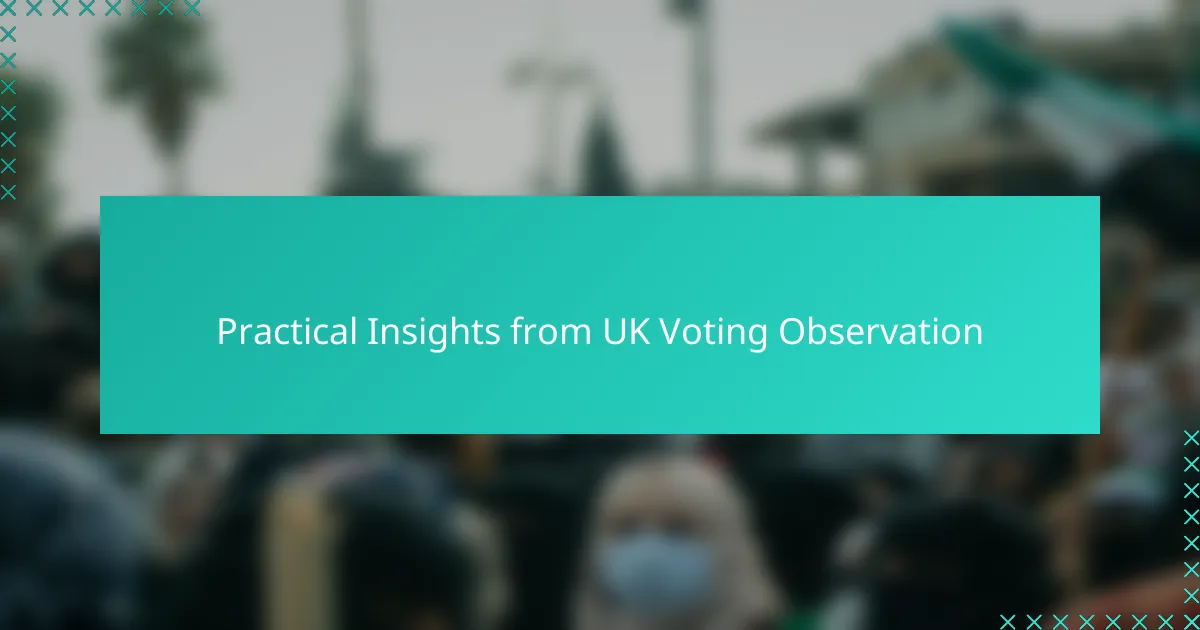
Practical Insights from UK Voting Observation
One thing that stayed with me during the observation was how smoothly the polling stations operated on election day. Despite the large turnout, the staff managed the flow of voters efficiently, which made the whole experience feel well-organized rather than chaotic. It made me think: how much does this visible orderliness contribute to public trust in the process?
I also noticed the subtle ways election officials ensured inclusivity—whether through clear signage, availability of assistance, or adapting for voters with special needs. These practical touches don’t grab headlines but, in my view, they are vital in making democracy accessible to all. Isn’t it these behind-the-scenes efforts that often define the true health of a voting system?
Finally, the atmosphere inside the polling station struck me as surprisingly respectful and calm. No matter the political tensions outside, every voter I saw seemed absorbed in their own private moment of choice. Watching this, I felt reminded that, beyond the political noise, voting is a deeply personal act—a trust placed in the democratic machinery that, when functioning well, empowers each individual voice.
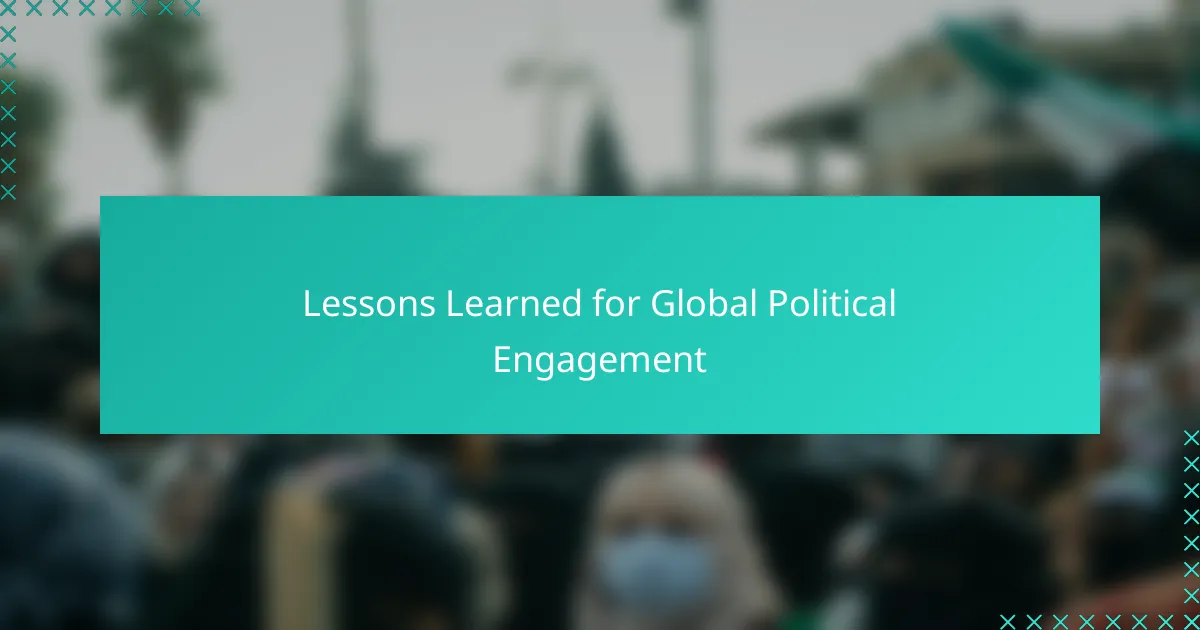
Lessons Learned for Global Political Engagement
Seeing the UK’s electoral process up close taught me that global political engagement benefits immensely from transparency and simplicity. When voters understand how their choices translate into representation, they feel empowered rather than alienated. Have you ever pondered how clarity in voting procedures might increase participation elsewhere? From my experience, even small efforts to demystify the process can bridge gaps between citizens and their governments.
I also realized how crucial inclusivity is—not just in theory but in the practical details like accessibility and voter assistance. Watching helpful staff ease first-time voters’ anxieties made me think: what if more countries invested in these personal touches? Such efforts can transform voting from a daunting task into an act of confidence and pride.
Lastly, the UK’s emphasis on ballot secrecy resonated with me deeply. It reaffirmed that protecting voter privacy isn’t just procedural—it’s foundational to genuine choice. Could global democracies strengthen their legitimacy by prioritizing this invisible yet powerful safeguard? Observing this firsthand, I’m convinced that trust begins where confidentiality is honored.
